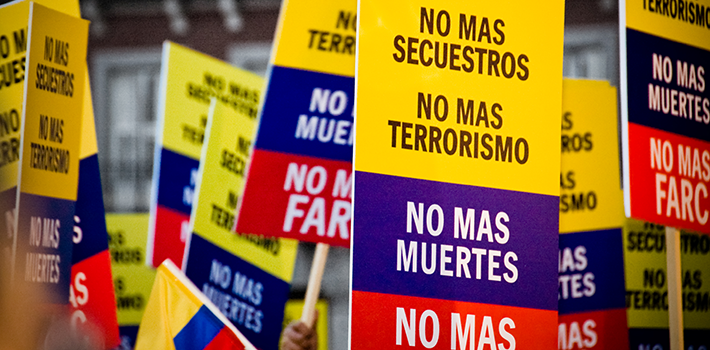
EspañolPeace negotiations between the government of Juan Manuel Santos and the Revolutionary Armed Forces of Colombia (FARC) have reached a dead end. As representatives enter the 28th round of talks, now focused on resolving the issue of reparations for FARC victims, negotiations are going nowhere.
For the past few weeks, Colombian military officers and guerrilla representatives have sat face to face to discuss a ceasefire. This includes a complete disarmament and demobilization of the FARC — a condition the Colombian government is not willing to back down from. Since then, the FARC have demonstrated they have no desire to negotiate on any serious level.
The FARC have demonstrated they have no desire to negotiate on any serious level.
The subversives, pretending as always to be on equal footing with the military forces of a democratic and constitutional state, flatly rejected the government’s proposal for an army-led “Transition Command.” For the FARC, it is unthinkable to be “subordinate to police forces.”
“By no means will the FARC accept a military hierarchy to solve problems that are of a political nature by definition. Important aspects [of the peace agreement], such as the surrender of arms, also involve the demilitarization of society and the state,” said Iván Márquez, FARC chief negotiator.
However, the government’s proposal was a logical one, as explained in a recent oped in El Tiempo: “The National Army must be present, representeing itself and the entire country, because its presence further proves that our institutions are committed to peace. It is essential that high-ranking military officers show the country that the process is on the right track. Their contributions, as experts in understanding the enemy, are essential in determining which mechanisms will successfully take what has been agreed upon at the negotiating table and implement it in the field.”
Instead, the rebels created their own Guerrilla Normalization Command, which aims to study how the military can return to what they consider to be their proper constitutional role: the defense of “national dignity” and the country’s borders. The Normalization Command also intends to study how best to dismantle counterinsurgency battalions and investigate paramilitary groups, even though a Truth Commission is already in place for that purpose.
What is the FARC hoping to achieve by taking such a die-hard position? Since the beginning of the peace process in Havana in November 2012, they must have known it would be impossible to reach an agreement, and transition into normal political life, without demobilizing and surrendering their arms. It should be obvious to anyone that these conditions must be met to order to reach a peace agreement between a legally established government and an irregular paramilitary force.
The only logical conclusion is that the rebels are trying to buy more time. On friendly territory, and with the support of their usual allies in the Castro regime, FARC leaders continue to comfortably organize and plot out their military, political, and propaganda strategies — schemes that will ultimately favor the guerilla and their friends in Cuba, Venezuela, and other members of the ALBA block. It’s that simple.
Their real objective is to continue buying time to increase their political, economic, and military strength.
September 7 marks the beginning of the annual Semana por la paz (Peace week) that the Catholic Church and numerous civil organizations organize every year to support the end of the armed conflict in Colombia.
However, just as in the previous 27 rounds of negotiation, the FARC will feign interest in these noble efforts by the Church and civil society. Their real objective is to continue buying time to increase their political, economic, and military strength.
The FARC’s own peace delegation members cannot help but reaffirm their ulterior motives every chance they get. In an interview in April, they confirmed that their “historical demands” remain the “primary political objective” of the guerrilla. They also stated that the Colombian government knows that they “never intended, nor plan to surrender,” and that “the only way out is to resolve the problems that initiated the conflict.”
 Versión Español
Versión Español












